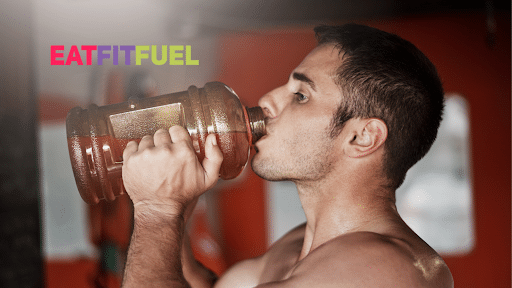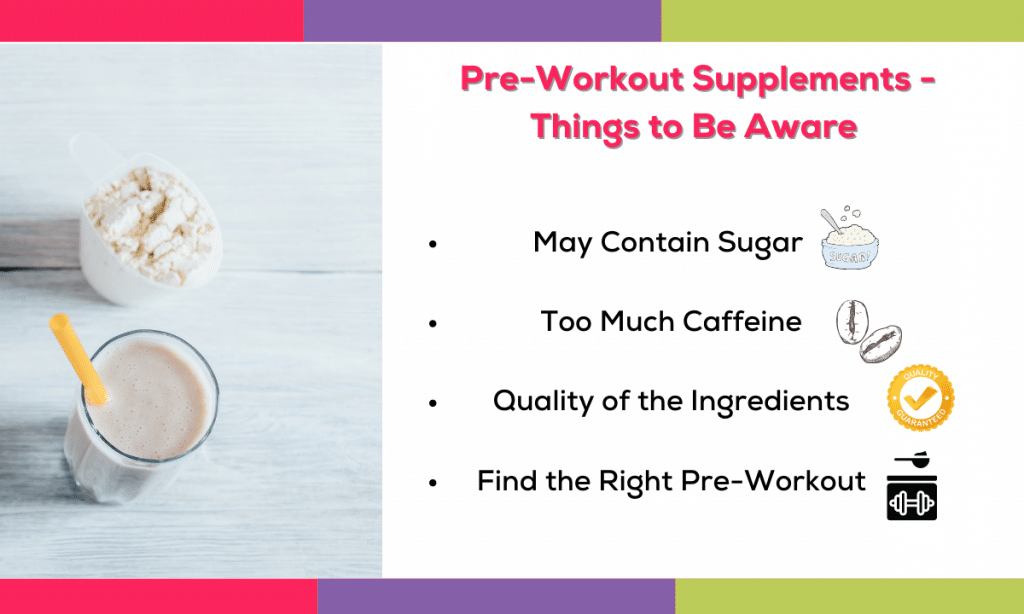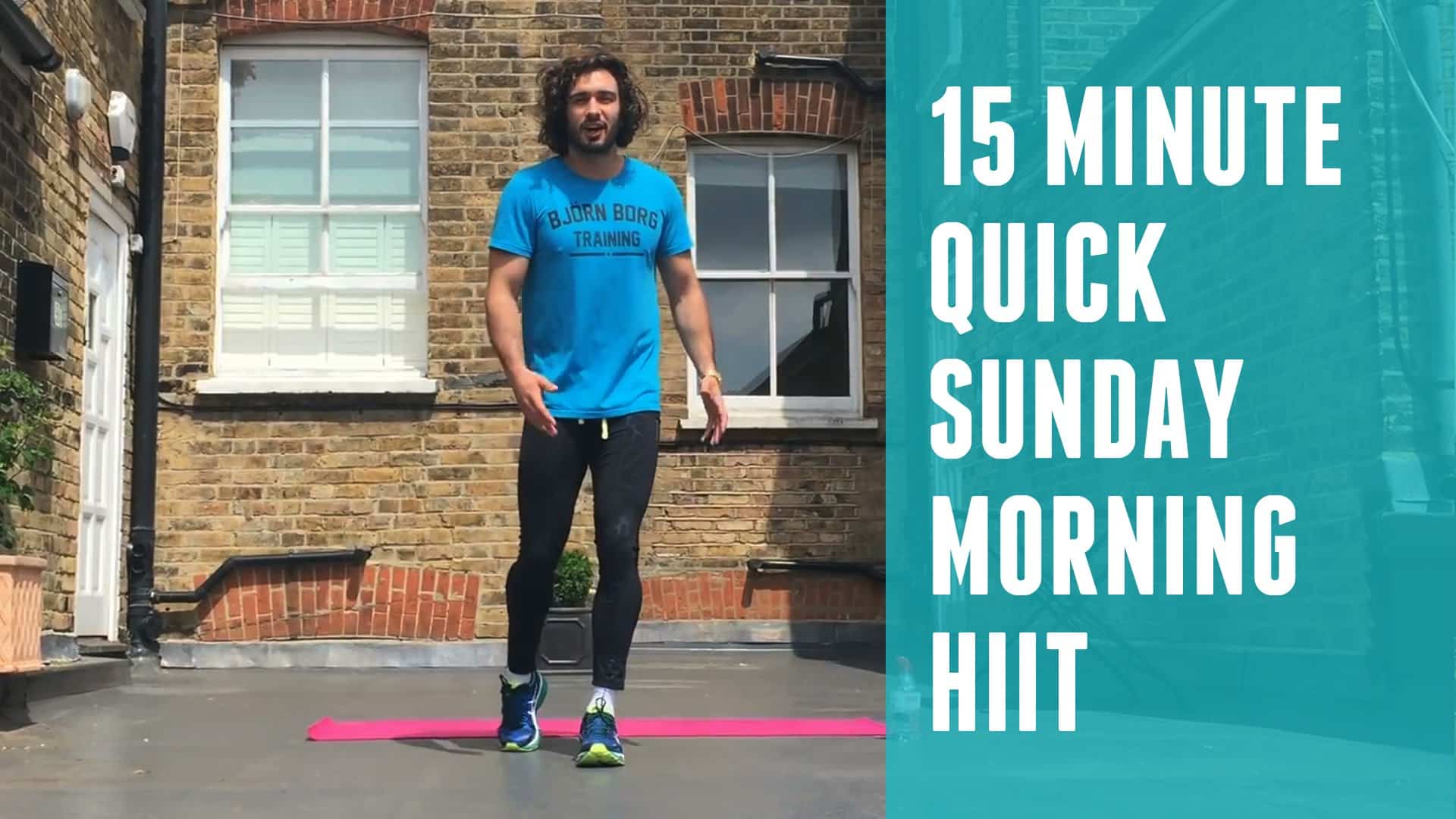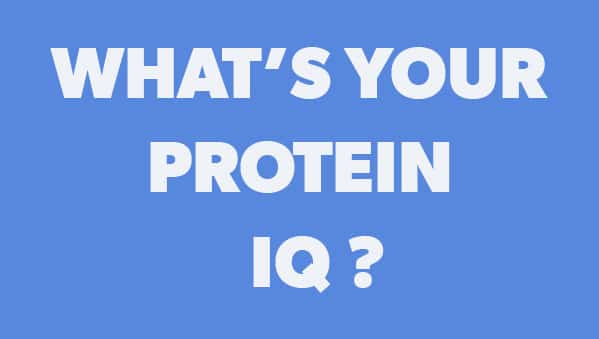Regardless of whether you’re planning to gain weight or lose it every calorie counts. When getting started on your fitness journey, knowing which supplements are most healthy and sustainable is essential. For most fitness enthusiasts, having a pre-workout and post-workout elevates their overall experience physically. According to research by Future Market Insights, the global market of pre-workout supplements is expected to be US$20,154 Million in the year 2023. That said, for some conscious about additives and calories, it’s normal to feel skeptical.
There is a never-ending stream of questions regarding what we put in our bodies. One of them is: does pre-workout make you gain weight? Good question. Is pre-workout even healthy in the long run? Well, in this article, we’ll dive into the essential things you need to know about pre-workout.
What Is Pre-Workout?
To ensure you have adequate energy and recover quickly from your workout, pre-workout is a supplement to help you improve your athletic performance. Pre-workout typically uses a variety of ingredients to enhance your workout, two of which are typically creatine and caffeine.
Besides this, pre-workout can contain other nutrients and ingredients like taurine, L-Citrulline, and branched-chain amino acids (BCAAs). These nutrients help produce nitric oxide, increase your endurance, and replace the essential amino acids your muscles require during workouts.
Does Pre-Workout Make You Gain Weight?
No, pre-workout does not make you gain weight as it typically is low in calories. That said, pre-workout contains creatine that can increase your water weight by 1 – 1.5% overall.
This is not fat but water retention that helps improve your overall muscle strength and power. Why would you need this? Put simply, it increases your overall muscle and helps burn fat. For some individuals, weight gain from creatine is not a concern as some bodies are non-responsive and don’t see the same change in body weight.
Besides that, for some individuals taking pre-workout who are gaining weight drastically, it would be sensible to monitor your overall calorie intake. While pre-workout may not increase drastic weight gain, looking into your calorie intake and reducing the size of your portions could be helpful.
Also read:
What Are the Typical Ingredients in Pre-Workout?
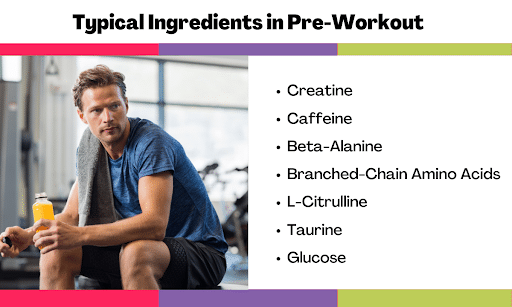
Creatine
Creatine is a popular ingredient that’s included in several pre-workout mixes. What does it do? In simple terms, creatine helps improve muscle mass, durability, and athletic performance during workouts. In more technical terms, creatine is an amino acid found in muscles that helps with muscle hypertrophy and long-term muscle growth.
In the world of fitness, creatine comes in two different types creatine monohydrate (an older, more popular option) and creatine nitrate, which is nitrate with a creatine base that can be more soluble in water and thus easier for your body to absorb.
Caffeine
Although caffeine can have downsides when it comes to using caffeine to enhance your workout, the results can speak for themselves. When used in moderation, caffeine can add increased endurance and focus to your workouts.
Caffeine works by blocking the signaling molecule adenosine, a hormone that tells your brain when you’re tired and fatigued. In turn, it increases the release of dopamine and norepinephrine, hormones that keep you motivated and focused.
Besides this, caffeine can also trigger the release of adrenaline, which is known to boost energy. It’s worth keeping in mind that excessive caffeine consumption causes you to feel tired afterward, which is why opting for a caffeine-free pre-workout option is a relatively sensible option.
Beta-Alanine
Beta-alanine is an amino acid that helps improve muscle endurance. Beta-alanine is an amino acid produced naturally by the body, which is non-essential. That said, it’s been proven to regulate your body’s carnosine production, which contributes significantly to muscle fatigue.
Branched-Chain Amino Acids (BCAAs)
Branched-chain amino acids in your pre-workout help reduce muscle breakdown, prevent fatigue, and lead to increased muscle growth. Known as branched-chain amino acids due to their chemical structure, BCAAs are naturally found in typically found in dairy and meat products.
One of the most common ingredients in pre-workouts, BCAAs can be beneficial when included in your workout regime and play a crucial role in long-term muscle growth.
L-Citrulline
In fitness, L-citrulline is consumed to help the functioning of your arteries, improving blood flow. Citrulline has also been known to have a regulating effect on individuals with high blood pressure. It’s also quite beneficial for individuals susceptible to anemia and fatigue. In general, L-citrulline helps with recovery and improves arterial stiffness.
Taurine
Typically found in energy drinks; taurine is an amino acid involved in a range of physiological functions. Absence or deficiency of taurine has been associated with anxiety and fatigue. In your fitness journey, taurine has been known to have anti-neurotoxic and anti-inflammatory effects meaning you’ll feel less fatigued during and after your workout.
Glucose
Glucose, often synonymous with sugar, is one of our body’s main energy sources. Glucose can be commonly found in most of the carbohydrate-based food we consume. In your pre-workout, glucose can help add energy and elevate blood sugar levels for an active workout. That said, increased glucose levels can result in high blood pressure.
Increased glucose levels can be harmful due to increased caloric intake for individuals looking to bulk up. That said, for individuals practicing portion control, having extra glucose can prevent you from feeling tired or worn out.
Also read:
- Best Blended Overnight Oats – 12 Delicious Recipes
- Leek Soup Diet – 7 Facts That You Need to Know (With Recipe)
- Huel vs Ka’Chava — Ultimate Comparison and Review in 2023
Is Pre-Workout Healthy? 5 Facts You Should Know
Based on your fitness goals, including pre-workout in your diet can definitely be beneficial. That said, with each new pre-workout you try out, you must pay attention to the nutritional facts available on the back and discuss the same with your nutritionist or physician.
1. Helps With Muscle Gains
One of the main reasons individuals are drawn to using pre-workouts is the fact that it’s quite beneficial when it comes to muscle gains. With ingredients such as creatine that help improve your muscle durability and contribute to muscle growth, pre-workout supplements are well sought after.
Besides this, it can help replace or replenish nutrients that are exhausted in the process of strength training or physical activity.
2. Improves Overall Strength and Endurance
When it comes to improving overall strength and endurance, pre-workout can help significantly with muscle growth and prevent fatigue with the help of beta-alanine and creatine. While bet-alanine helps with reducing fatigue, creatine, along with the BCAAs present in pre-workout, help improve muscle strength and endurance.
3. Can Help You Stay Focused and Energized During Workouts
Pre-workouts can help individuals stay focused during workouts with the help of ingredients like caffeine and taurine. The caffeine and glucose contribute significantly to keeping blood pressure levels elevated and the production of adenosine low to help you feel pumped a lot quicker.
While the process of exercising is known to help release endorphins, caffeine helps with the release of dopamine and norepinephrine to keep you motivated and focused.
4. Improves Recovery From Excercise
Beta-Alanine, L-citrulline, and taurine, which are common ingredients in pre-workout help improve your overall recovery and post-workout fatigue. Besides helping with muscle growth, one major benefit of pre-workout is the improved recovery time from exhaustive or more strenuous workout sessions.
While pre-workout is not a miracle worker, it makes a considerable difference in the overall performance and fatigue you experience after a grueling workout.
5. It Can Have Some Side-Effects
Based on your sensitivity to specific ingredients, pre-workout can cause anxiety and even restlessness, likely due to the presence of caffeine. Besides this, however, quickened heart rate, insomnia, and nausea are some of the other side effects individuals can experience. While this is not extremely common, some ways to counter these effects would be to opt for a pre-workout that does not use caffeine and or with low glucose.
Things to Be Aware of When Consuming Pre-Workout Supplements
May Contain Sugar
Some people don’t mind consuming pre-workout supplements with sugar content in it. However, if you are not a fan of sugar content in your pre-work supplement, or are trying to curb sugar in your diet, it is always good to check your labels. Consuming large amounts of sugar can result in undesirable symptoms, like gassiness and bloating.
As a gym goer, you wouldn’t want to experience this. So, it is a good idea to consult your dietician to discuss their recommended sugar intake.
Too Much Caffeine
It is a known fact that consuming too much caffeine can affect your progress in the gym. Although caffeine is commonly found in pre-workout supplements, consuming it in excessive amounts can have side effects, such as disruption of sleep, anxiety, and high blood pressure.
Quality of the Ingredients
It is always a good idea to check the label of the product before buying, to make sure it is made of good quality ingredients. Additionally, learning the ingredients enables you to get an understanding of the benefits you will get out of it. Look for the ingredients that can provide you with enough energy, muscle strength, endurance, and fat loss.
Find the Right Pre-Workout
Finding the right pre-workout supplement can be hard, considering that pre-workout supplements come in so much variety. You’ll have to do a trial and error approach in order to find the fitting pre-workout supplement that works for you.
In addition to this, hydration, getting the right amount of sleep, and getting proper nutrition from your diet can also help the efficiency of the pre-workout supplements.
Does Pre-Workout Make You Gain Weight — Conclusion
While some pre-workout may lead to some weight gain, this is mostly water retention which is healthy as it builds overall muscle size and durability. in the long run, however, any increased weight caused by pre-workout leads to higher stamina and strength, which can help you burn unhealthy fat.
For those weight conscious, monitoring your overall calorie intake and ensuring you’re consuming adequate water is an excellent place to start. In cases where the problem still persists, consulting with a physician and dietitian is usually the best way to go. Did you find this article helpful? Check out our other blogs too!
Frequently Asked Questions
What is pre-workout?
Pre-workout is a supplement in the form of a powder or pill, typically consumed 15 to 30 minutes before your workout to improve your athletic performance and recovery. In the long run, consuming pre-workout can improve muscle growth and more solid workout sessions.
Does pre-workout make you gain weight?
Technically, it can at times. That said, any weight gain from pre-workout is due to water retention in muscles that lead to improved strength and, with consistent workouts, reduced fat.
Is pre-workout a requirement for good exercise?
While not mandatory, including pre-workout in your daily exercise routine can improve the overall quality of your workouts. Besides speeding up the recovery process and lowering your post-workout fatigue, it also helps with muscle growth.
Can I take pre-workout every day?
Taking a pre-workout on a regular basis can make your body more tolerant of its effects. Most suggest taking not more than 1 supplement a day. Always make sure you cycle the supplement and take a break every 6 to 8 weeks to allow your body to reset.
Should I eat before working out in the morning?
Yes, in fact eating before your morning workout can help your body provide enough fuels that it needs. If you plan to do a strength training session, having a small meal or snack 1 to 3 hours before the session is recommended by experts.
How long does it take Pre-Workout to kick in?
Pre-workout is somewhat similar to strong coffee, as it has similar effects as your morning brew. For most people, it takes around 30 minutes to one hour for the pre-workout to kick in.
